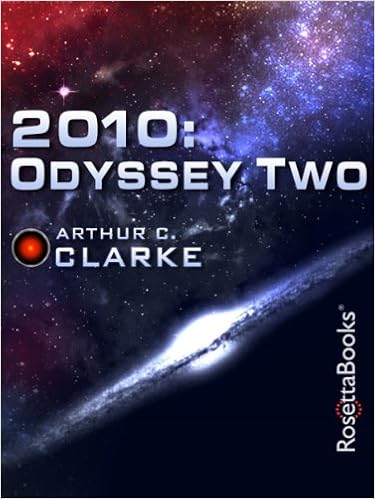We continue Space Odyssey month with the second installment of Arthur C. Clarke's series, 2010: Second Odyssey. I will say that these books are going to be a little bit different from the first one because they're written about fifteen to twenty years later than the first. As Clarke himself says, we hadn't even landed on the moon yet when 2001: A Space Odyssey went to print. By the time he began writing sequels in the eighties we had expanded much further into space with probes, but had also fallen back, making manned missions only into orbit. (Which, as of 2016, is the limit of our abilities. Although NASA has high hopes of sending someone to Mars in the future.)
From this point forward, Clarke makes use of the elements of the movie plot rather than the original novel. The chief difference between these is that the mysterious monolith sends a message to Jupiter rather than Saturn, but this is a fairly trivial change in the grand scheme of things. How Dave Bowman reacts to HAL's rebellion is a little different, but the end result is the same. The biggest thing I noticed most about 2010: Odyssey Two is that there are references to real-life events which had helped expand our knowledge of space, as well as shape science-fiction as a genre, which occurred after the 1960's. Specifically Clarke mentions the Galileo and Voyager missions which gave us far more information about Jupiter and revealed that the moons of Io, Callisto, Ganymede, and Europa were far more interesting than we could have imagined. Clarke also slips in a couple references to Alien and Star Wars, which definitely updates the book and as those movies are still science-fiction classics it certainly doesn't date the book. (References to the Soviet Union aside.)
Plot-wise the book picks up a few years after the ill-fated Discovery expedition to Jupiter, in which all the crew except Dave Bowman perish and Dave, after a cryptic final message, appears to vanish. The United States is eager to recover their lost ship, especially before the Soviets or Chinese can claim it as salvage, but the construction of Discovery II is still underway and it looks like the Americans won't be the first to reach Jupiter. More pressingly, Discovery's previously stable orbit is decaying and it is in very real danger of crashing into Io in the next few years, taking all its information with it. Somewhat reluctantly the Soviets and Americans join forces with the agreement to share all information and find out just what the heck happened out at Jupiter with the mysterious monolith.
The thing that I really liked about all of this is the book took on a far less flowery and dramatic tone than the previous novel. In 2001 Clarke tended to lapse into purple prose and speak about the great destinies involved and the unknown but inevitable fates that humanity was moving towards, almost to the point of being melodramatic. Which is fine, but I had a bit of a hard time taking him seriously sometimes. 2010, by contrast, takes a far more pedestrian tone, which is really cool. Characters have discussions about launching a mission to Jupiter like it's something that happens all the time. And if it happened in our lives it would almost certainly be a huge deal, but I find it absolutely amazing that people could talk about this like it was no big thing. That almost makes it more convincing science-fiction for me than all the alien intelligences and mysterious monoliths. At certain points Clarke sort of lapses into his flowery prose once again, but for the most part I just sort of enjoy how mundane it all is.
In this book, much like the previous one, conflict with HAL is fairly minor and Clarke decides to put much more focus on the monoliths and the forces behind them. There is some concern that HAL may rebel once again and human lives will be put in danger, but it's handled very easily. I mean, Clarke may be making a point that most conflict can be avoided if you handle it properly and it doesn't have to be resolved with force, but it's such a minor part of the overall story. It almost feels like it was shoe-horned in because Clarke had to tie up some loose ends so he could get back to talking about monoliths.
And, on some level, I don't find the monoliths terribly interesting. Once the main mystery of what is their purpose is explained, they become kind of boring. It's all part of some vague plan by ancient aliens to promote intelligent life throughout the galaxy because they were lonely. If we got to speak with these ancient aliens and get to understand them a little bit better they'd probably be a bit more interesting, but they're basically described as ineffable beyond that little bit I've already talked about and having vague and mysterious purposes. It's just hard to get interested in characters that aren't described terribly well.
Finally I personally felt like this book was sort of a middle in the series. There's a book that comes before it, and a book Clarke wants to write that comes afterwards, so he has to write something to connect the two. It's okay, but it's serving as a bridge at best. I'll see if my assessment is correct when I read the next book, but by the end I was left with a bit of a mediocre feeling about this one. Next week we jump forward to 2061: Odyssey Three.
- Kalpar


No comments:
Post a Comment